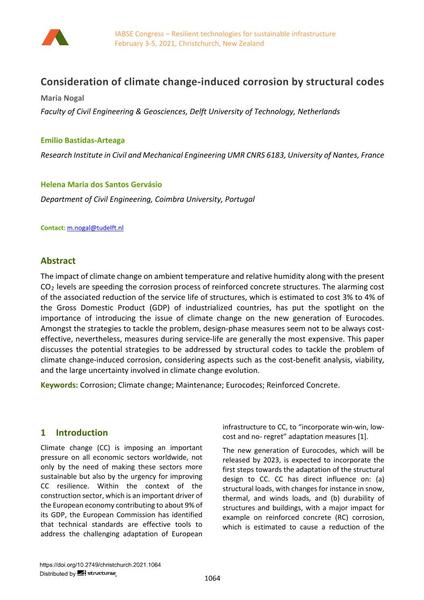Consideration of climate change-induced corrosion by structural codes

|
|
|||||||||||
Détails bibliographiques
| Auteur(s): |
Maria Nogal
(Faculty of Civil Engineering & Geosciences, Delft University of Technology, Netherlands)
Emilio Bastidas-Arteaga (Research Institute in Civil and Mechanical Engineering UMR CNRS 6183, University of Nantes, France) Helena Maria dos Santos Gervásio (Department of Civil Engineering, Coimbra University, Portugal) |
||||
|---|---|---|---|---|---|
| Médium: | papier de conférence | ||||
| Langue(s): | anglais | ||||
| Conférence: | IABSE Congress: Resilient technologies for sustainable infrastructure, Christchurch, New Zealand, 3-5 February 2021 | ||||
| Publié dans: | IABSE Congress Christchurch 2020 | ||||
|
|||||
| Page(s): | 1064-1070 | ||||
| Nombre total de pages (du PDF): | 7 | ||||
| DOI: | 10.2749/christchurch.2021.1064 | ||||
| Abstrait: |
The impact of climate change on ambient temperature and relative humidity along with the present CO₂ levels are speeding the corrosion process of reinforced concrete structures. The alarming cost of the associated reduction of the service life of structures, which is estimated to cost 3% to 4% of the Gross Domestic Product (GDP) of industrialized countries, has put the spotlight on the importance of introducing the issue of climate change on the new generation of Eurocodes. Amongst the strategies to tackle the problem, design-phase measures seem not to be always cost- effective, nevertheless, measures during service-life are generally the most expensive. This paper discusses the potential strategies to be addressed by structural codes to tackle the problem of climate change-induced corrosion, considering aspects such as the cost-benefit analysis, viability, and the large uncertainty involved in climate change evolution. |
||||
